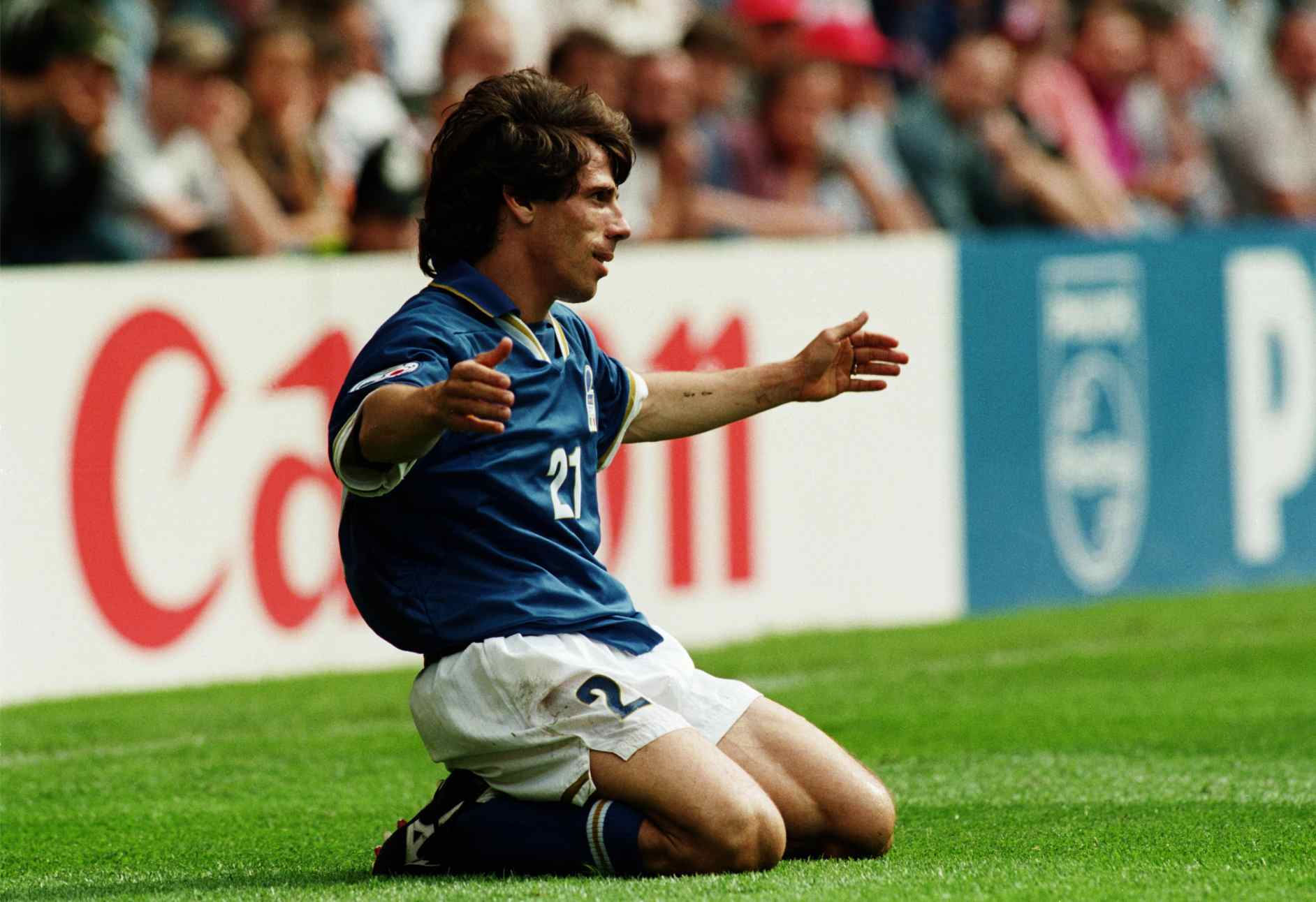
‘And Then I Cried’: How Gianfranco Zola’s Only World Cup Appearance Turned into a Nightmare
By Dan Cancian
Such was the controversy surrounding the last ever game played at Foxboro Stadium, that it warranted its own name – The Tuck Rule Game.
The AFC Divisional Playoff game in January 2001 is considered as the first stepping stone on the road to the unprecedented era of domination the New England Patriots cast over the NFL for the next two decades.
And for good reason. Had the officials not ruled Tom Brady had attempted to ‘tuck’ the ball under his arm after halting his passing motion, the Baltimore Ravens would have emerged 13-10 winners.
But a technicality rescued Brady and the Patriots, kick-starting one of the most exhilarating runs in the history of modern sport.
There had been no such reprieve for Gianfranco Zola eight years earlier, when the pint-sized forward was sent off by Mexican referee Arturo Brizio Carter in Italy’s Round of 16 clash against Nigeria.
With the Azzurri trailing 1-0 and staring down the barrel of elimination, Arrigo Sacchi turned to Zola for inspiration on his 28th birthday. Prolific Italian strikers may be at a premium these days, but back in 1994 the Azzurri’s attacking options bordered on the preposterous.
With Giuseppe Signori, Zola and Roberto Baggio, Sacchi could choose between Serie A’s three most prolific strikers that season.
With 23 goals, only Signori had bettered Zola’s tally of 18 goals and the Sardinian replaced the Lazio forward with 65 minutes gone, making his World Cup debut after watching the three group stage matches from the bench.
Only ten minutes had elapsed from his introduction, by the time Zola went down in the box after tangling with Nigeria right-back Augustine Eguavoen.
As Brizio Carter waved play on, Zola sprung back to his feet and swiftly won possession off Eguavoen, in what would be lauded as a brilliant display of counter-pressing in 2024.
Now it was Eguavoen’s time to theatrically hit the turf and to convince Brizio Carter that Zola’s energy was deserving of a red card.
Not that the Mexican would need any encouragement. Like an overzealous traffic warden, he dished out seven red cards across two World Cups – a record which still stands.
For Zola, however, the red card was an aberration in a career that contained just 17 yellow cards over 16 seasons.
“When I saw the red card I cried”
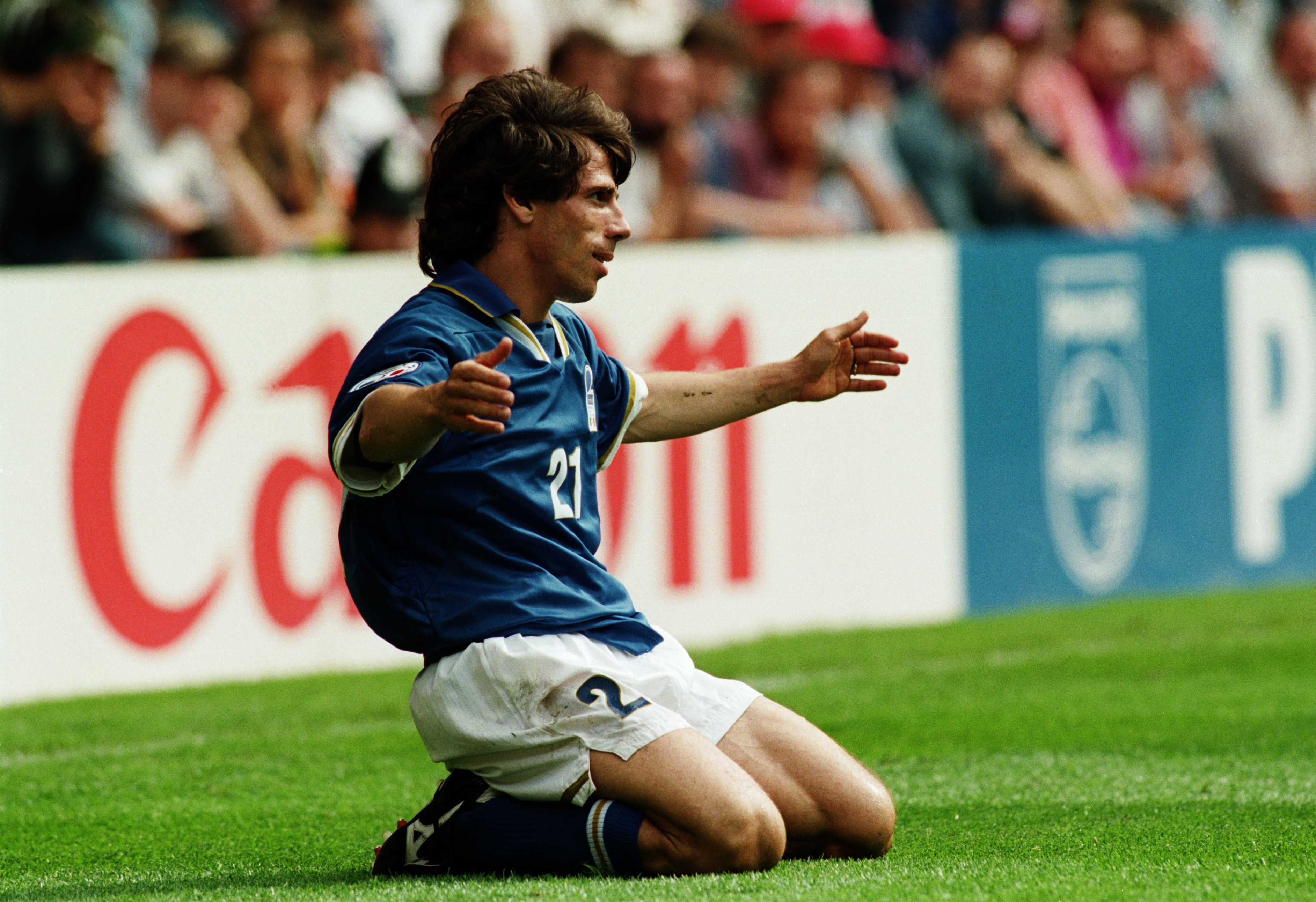
“When the whistle went, I thought: ‘He [the referee] has blown for a free-kick that never was’,” Zola told reporters the following day.
“When he went to take his card out, I was worried: ‘Is he seriously going to book me? That’s absurd.’ Then I saw the red card and I couldn’t believe it. I thought: ‘Sent off? Why? What for?’.
“I wanted my teammates to stop him and then I cried.”
Like many of his compatriots, Zola would have cried tears of joy exactly 12 years earlier as Italy beat Brazil 3-2 at the 1982 World Cup, a near-perfect birthday present for the 16-year-old Gianfranco.
By 1994, football was an altogether different beast, its desire to expand its horizons rubber stamped by FIFA’s decision to take the World Cup to the USA that summer.
Taking football’s biggest extravaganza Stateside was a logistical challenge, involving teams flying across multiple time zones for group games alone.
Nigeria played their opening Group D game in Dallas, but travelled 2,000 miles and two time zones to Boston – approximately 50 miles from Foxborough – for their remaining two group games.
Italy had it slightly easier, playing their first two games at the old Giants Stadium in New Jersey and then travelling to Washington for their final game in Group E.
If the choice of venues was controversial, the decision to schedule matches early in the afternoon to suit television audiences in Europe was downright dangerous.
Soaring temperatures and stifling humidity were the norm throughout the tournament. Players welfare be damned.
Humidity hovered around the 90 percent mark by the time Italy and Nigeria took the field at Foxboro Stadium at 1pm local time – 5pm BST and 6pm in central Europe.
Italy’s 1994 World Cup campaign: To Hell and Back
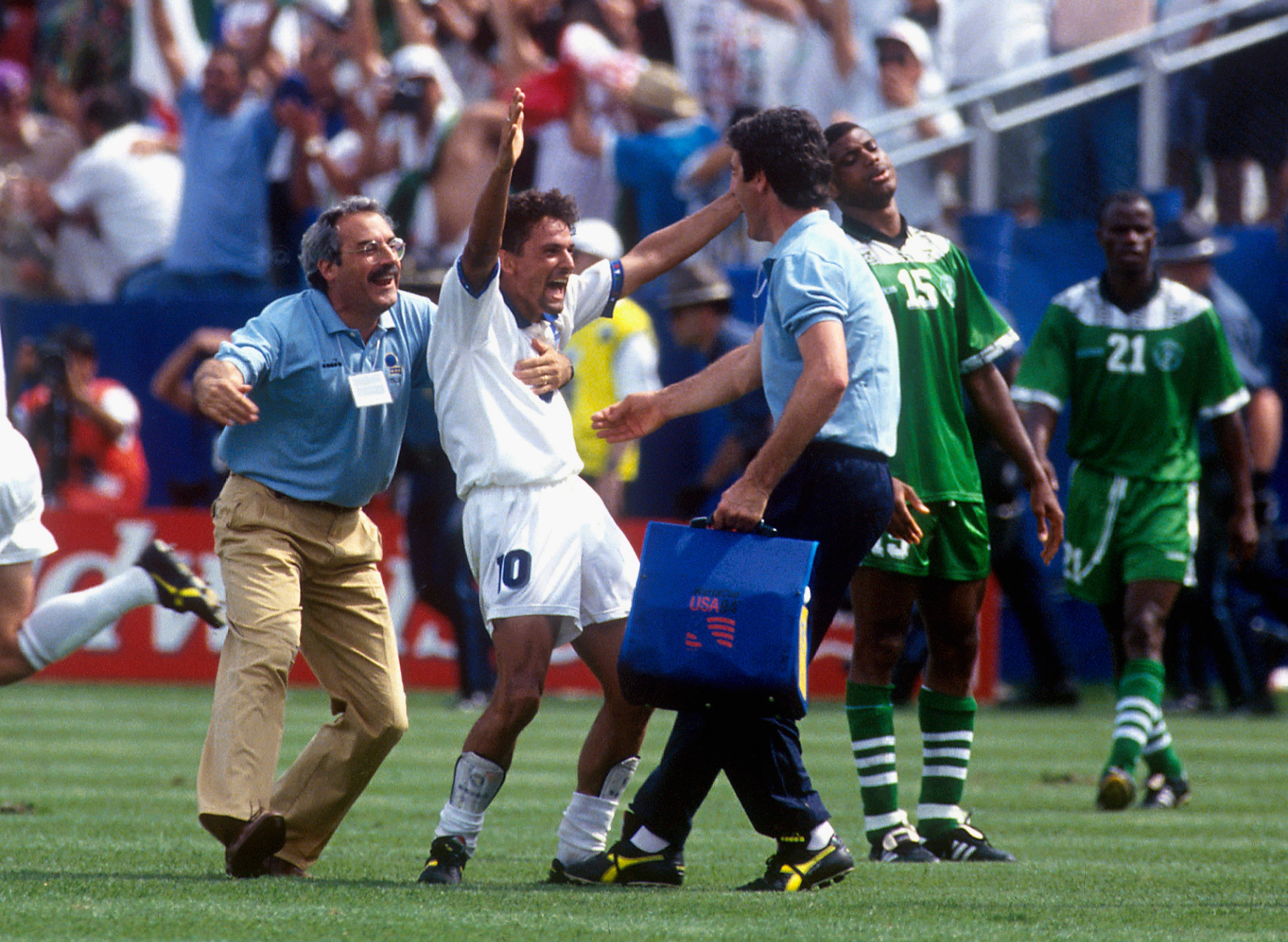
“Italy: To Hell and Back” proclaimed La Stampa’s headline the following day, a nod to New England’s blazing hot summer and the Azzurri’s ordeal.
To suggest Italy had been underwhelming in the group stages would be extremely generous towards Arrigo Sacchi’s team.
Beaten 1-0 by the Republic of Ireland in their opener, the Azzurri defeated Norway by the same score courtesy of a Dino Baggio goal after losing captain Franco Baresi to injury and Gianluca Pagliuca to a red card.
Sacchi’s decision to sacrifice Roberto Baggio in favour of Luca Marchegiani following Pagliuca’s sending off split public opinion in Italy like only Sacchi could. The Divine Ponytail, for his part, could barely conceal his disgust as he walked off the pitch.
The finest Italian footballer of his generation, Baggio had been crowned the best footballer in the world just six months earlier and had finished the season as Serie A’s third-most prolific top scorer with 17 goals behind Signori and Zola.
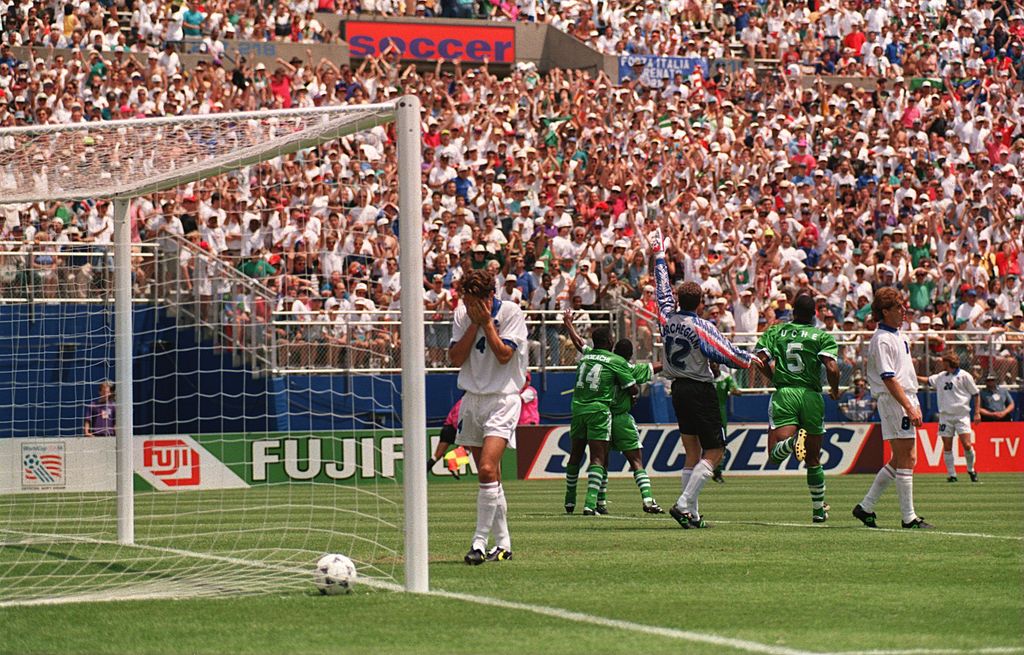
The former started up-front with Baggio in the defeat against Ireland and was then shunted out on the left wing for games against Norway and Mexico, with Pierluigi Casiraghi and Daniele Massaro taking his place.
The latter’s goal in a 1-1 draw against Mexico was enough to send Italy through as one of the four best-placed third teams, along with Argentina, who had finished third in Group E behind Nigeria and Bulgaria.
Despite losing to the Albiceleste in Foxboro as Diego Maradona’s World Cup career ended in misery, the Super Eagles advanced as group winners on goal difference as all three teams finished on six points.
In the New England heat, Nigeria struck halfway through the first half, as Emmanuel Amunike turned the ball past Marchegiani from close range after Paolo Maldini had failed to clear a George Finidi corner.
Sacchi’s dogmatic refusal to steer away from his preferred 4-4-2 meant Signori again found himself exiled on the left wing with Massaro up-front alongside Baggio.
And with Italy toiling in their quest for an equaliser, the Lazio striker made way for Zola midway through the second half as Sacchi turned to his bench for inspiration.
His gamble was a calculated one. Zola may have been an unused substitute in the first three matches, but had arrived in the USA on the back of a spectacular first season with Parma after signing from Napoli for £13m.
The Sardinian scored 20 goals in 51 appearances in all competitions as Parma finished fifth in Serie A, reached the Coppa Italia semi-finals and lost the Cup Winners’ Cup final to Arsenal.
But Zola’s hopes of becoming Italy’s hero vanished the moment he received his marching orders from Brizio Carter.
The Mexican referee had endured a curious tournament. In the same game, he failed to send off Maldini after the AC Milan defender hacked down Rashidi Yekini as the Nigerian looked to be clear through on goal.
His performance in the World Cup opener between reigning champions Germany and Bolivia had been similarly erratic.
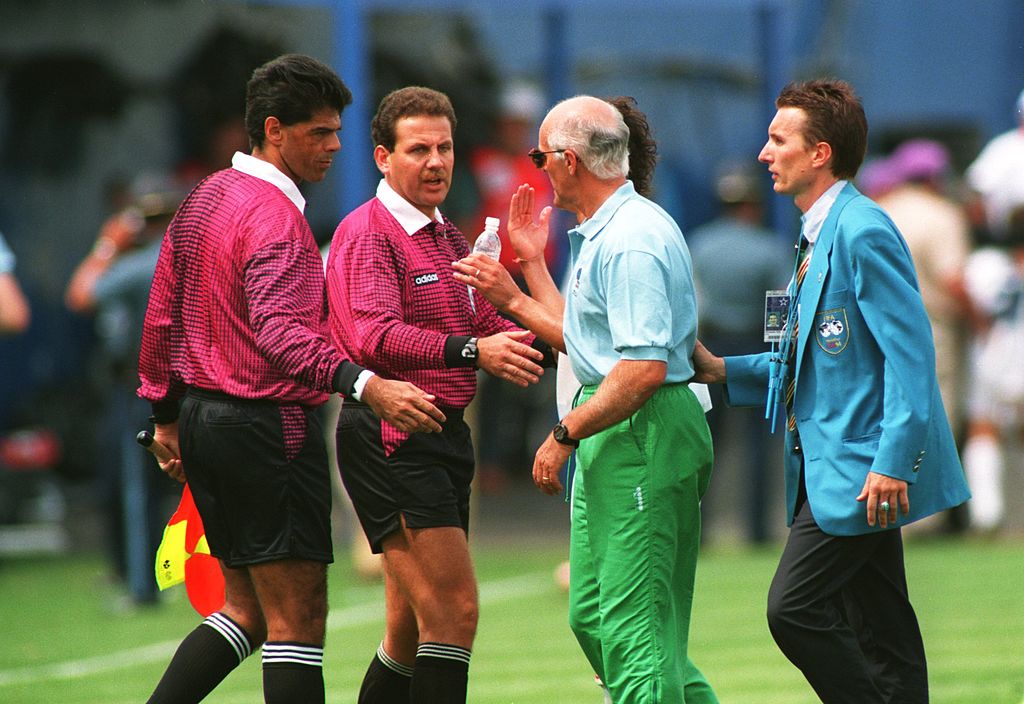
Brizio Carter booked Jürgen Köhler for a perfectly clean tackle, but Thomas Hässler later escaped punishment for a vicious late lunge.
The most questionable call of all, however, came as he sent off Marco Etcheverrey in the second half after the Bolivian substitute kicked out at, but missed, Lothar Matthäus in retaliation for some robust treatment from the German, whose forearm had smashed him in the face.
Visibly in distress, Zola took his anger out on the advertising boards as he walked off the pitch, an unusual outburst for such a mild-mannered player.
“I felt an incredible anger in me,” he recalled years later.
“I’d never felt anything like it. I left the team down to 10 men at the hardest point of our World Cup.
“I briefly thought about me, but mostly about my teammates, who wanted to console me, but could find neither the words nor the energy to do so.”
Down to 10 men, devoid of ideas and rhythm and staring elimination in the face, Italy’s destiny seemed sealed. Baggio, however, had other ideas. With two minutes left, the Divine Ponytail met Roberto Mussi’s cross, arrowing a perfectly controlled finish into the bottom corner past Peter Rufai.
Baggio had waited almost four games to open his World Cup account, but now he completed his brace in 14 minutes, scoring from the spot just before half-time in extra-time after Antonio Benarrivo had won a rather dubious penalty.
Italy’s qualification was of scant consolation to Zola, whose two-match suspension ruled him out of wins against Spain and Bulgaria in the quarter-final and semi-final respectively.
By the time the Azzurri faced Brazil in Pasadena in the World Cup final, Zola had served his ban but he watched from the bench as Baresi, Massaro and Baggio missed from the spot.
The Sardinian’s first and last World Cup appearance lasted 10 minutes. As he reflected years later: “It was the worst birthday of my life.”
Related Articles
Related Articles
The Serie B season reaches halfway when the action returns after the winter break, with more live matches to look forward to on DCTV.
Florence is a dream destination year-round, but visiting during the winter months offers a completely different and magical experience.
We get a local take on what's hot in Cremona - where to eat and drink, sights to see and handy hints that might not be in the tourist guides.




